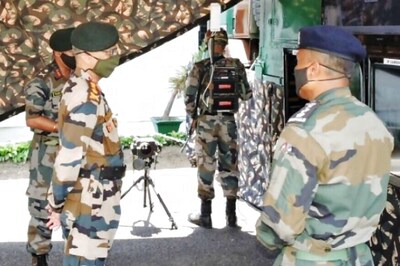
views
Islamabad: Pakistan army and the government on Thursday reacted sharply warning India against any Abbottabad-like "misadventure", saying it would be responded to "very strongly" that could lead to a "terrible catastrophe".
The warning came after a meeting of the Corps Commanders chaired by Gen Ashfaq Pervez Kayani, which decided to reduce the level of US military personnel in Pakistan and threatened to review intelligence cooperation with it, if a repeat of "violation of sovereignty" like on Monday occurred.
Reacting to statements by Army Chief Gen VK Singh and Air Chief Air Marshal PV Naik that India has the capacity to carry out an operation similar to US forces eliminating Osama bin Laden, first Pakistan Foreign Secretary told a press conference that any country that attempts to "mimic" the unilateral act of the US will find it has made a "basic miscalculation".
"We see a lot of bravado in our own region. There have been statements that have come from across (the border), by senior people from the military and air force, which state that this can be repeated.
"We feel that sort of misadventure or miscalculation would result in a terrible catastrophe," he said in his opening remarks.
Later, the military issued a statement after the Corps Commanders meeting, saying, "The forum, taking serious note of the assertions made by Indian military leadership about conducting similar operations, made it very clear that any misadventure of this kind will be responded to very strongly. There should be no doubt about it."
The meeting held at the General Headquarters in Rawalpindi issued the warning after reviewing the operation in which bin Laden was killed on Monday.
Referring to the US raid, Kayani "made it very clear that any similar action, violating the sovereignty of Pakistan, will warrant a review on the level of military (and) intelligence cooperation with the United States."
The Corps Commanders were also informed about a decision "to reduce the strength of US military personnel in Pakistan to the minimum essential." The statement did not say how many US military personnel would be asked to leave Pakistan.
In the face of continuing media reports that the US has plans to secure Pakistan's nuclear assets in the event of a takeover by extremists, the army's top commanders made it clear that targeting the atomic arsenal would not be as simple as hitting bin Laden's compound.
"As regards the possibility of similar hostile action against our strategic assets, the forum reaffirmed that, unlike an undefended civilian compound, our strategic assets are well protected and an elaborate defensive mechanism is in place," the statement said.
The statement said the US raid in Abbottabad was the "one point agenda" of the meeting. "The forum discussed the incident and its implications on military-to-military relations with the United States," it said.
The military admitted its "own shortcomings in developing intelligence on the presence of Osama bin Laden in Pakistan" and said "an investigation has been ordered into the circumstances that led to this situation".
At the same time, the military "highlighted that the achievements of Inter-Services Intelligence against al Qaeda and its terrorist affiliates in Pakistan have no parallel".
The statement said around 100 top-level al Qaeda leaders and operators were killed or arrested by the ISI with or without the support of the CIA.
"However, in the case of Osama bin Laden, while the CIA developed intelligence based on initial information provided by ISI, it did not share further development of intelligence on the case with ISI, contrary to the existing practice between the two services," the statement alleged.
The commanders also reiterated their "resolve to defend the sovereignty and territorial integrity of Pakistan" and to fight terrorism with the support of the people.
Earlier, Foreign Secretary Bashir accused Indian establishment and its armed forces of trying to subvert Prime Minister Manmohan Singh's agenda by making statements which were a "matter of concern".
"I only see them as symptomatic of trends and tendencies within the Indian establishment and their armed forces to subvert the agenda of Prime Minister Manmohan Singh. I don't think the Indian leadership would really subscribe to this".
Responding to a query on the remarks of Indian military officials about mounting a raid against leaders of Pak-based terror groups like the Lashkar-e-Taiba, Bashir said such comments are "a matter of concern".
Bashir highlighted the need for a "serious constructive approach" and said Pakistan was engaged in a process of dialogue with India.
"We have had good meetings recently between the Home and Interior Secretaries of the two countries on counter-terrorism and counter-narcotics. We have done everything that we can and we are continuing to do in terms of cooperating to avert the possibilities of terror between our two countries", he said.
Bashir even questioned whether the 2008 Mumbai terror attacks could be described as "an intelligence failure or security failure on the part of India."
He also sought to equate the incident to the questions of "incompetence or complicity" being raised about Pakistani security forces in the context of the US raid that killed bin Laden.
Bashir mounted a strong defence of the ISI in the wake of questions raised by US officials about its failure to detect bin Laden even though he was living in a compound located less than a kilometre from the Pakistan Military Academy.
He also sought to dispel the impression that the US raid had taken bilateral relations to a fresh low.
While acknowledging that the unilateral and covert US operation had been successful in eliminating bin Laden, Bashir said it was "fortunate that a major tragedy that could have happened was averted" as the Pakistan Air Force had scrambled two F-16 jets after learning that some helicopters were present over Abbottabad.
Referring to comments by US officials like CIA chief Leon Panetta about the possible complicity of Pakistani security forces or intelligence agencies in sheltering bin Laden, he said such remarks had "continued to surface periodically" to pressure Pakistan to "do more" in the war on terror.
"It's easy to say the ISI or elements within the government were in cahoots with al-Qaeda. This is a false hypothesis and a false charge. It cannot be validated on any account and it flies in the face of what Pakistan and the ISI has been able to accomplish," he contended.
Bashir claimed the ISI had been more successful than even the CIA in capturing or killing al-Qaeda and Taliban elements.
The ISI had shared information on the compound where bin Laden was found since 2009 and had also focused on Abbottabad since 2004, he said.




















Comments
0 comment